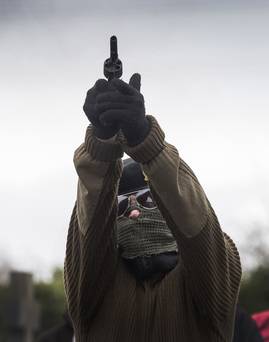
When former revolutionaries become the establishment certain compromises are inevitable. Nowhere is this more clearly on display in Northern Ireland than when the issue of armed struggle comes in to the public eye, as it does every Easter season when the Republican Movement commemorates the 1916 Rising. Here’s an example:
I also want to pay tribute to the bravery, leadership and commitment of the IRA in this generation who fought in the streets of our towns and in the highways, byways and fields of our countryside. If courage was the measure of success then Ireland would have had her freedom long ago … I think I can speak for many thousands of Irish republicans who came through the conflict when I say that we are proud of our time as volunteers in the Irish Republican Army.
And another:
Armed struggle must be a contributory factor to a wider struggle. The use of arms prior to 1916 was legitimate. The use of arms in Easter 1916 was legitimate. The use of arms after 1916 was totally legitimate. In the existing political context of partition, illegal occupation and the denial of national self determination, armed struggle, in 2015, remains a legitimate act of resistance.
And now back to our first speaker:
There are small groupings within the Nationalist community opposed to the peace process and opposed to Sinn Féin. These groups have every right to disagree with our strategy but they have no right to carry out armed actions, the vast majority of which are directed against unarmed civilians, in the name of Irish Republicanism. These small groups are not the IRA. The IRA fought a war against State combatant forces and fought it to a conclusion.
So who’s who in these conflicting takes on the legitimacy of continued armed resistance to British rule in Northern Ireland? The first speaker is Gerry Kelly, a famed IRA veteran (part of the team that planted four car bombs in the center of London in 1973) and one of the highest-profile members of Sinn Fein, serving on its national executive and as an MLA representing North Belfast at Stormont.
Kelly is currently running as Sinn Fein’s candidate for a seat in the British parliament at Westminster. His comments were delivered as part of the Easter commemoration oration he gave at the Republican plot in Belfast’s Milltown Cemetery, the resting place of many an IRA volunteer killed on “active service” against the British state that Kelly attacked in 1973 but today serves as a member of the Stormont government.
The second speaker is Dee Fennell, a young Republican community activist from the Ardoyne neighborhood of North Belfast. I heard him speak in Dublin in early March during an event held by one of the faster-growing “dissident” Republican groups. In that setting he skirted around giving the kind of open endorsement of armed struggle that he voiced in his Easter oration at the Republican plot at St. Colman’s Cemetery in Lurgan, Co. Armagh. Video of his statement had been posted to YouTube but has since been taken down.
From Kelly’s perspective the need for armed struggle is over. The IRA, his IRA, fought the British state to a standstill. The movement now can accomplish its goals through exclusively peaceful and democratic means.
From Fennell’s perspective the need for armed struggle is as real as it has ever been. People like Kelly, who may have once fought with honor and distinction, are now no more than cogs in the engine that perpetuates partition and foreign occupation. A new IRA, which Fennell said is increasing in its capabilities and effectiveness, will pick up and carry on to finish the job that Kelly’s IRA failed to complete.
What’s fascinating about the positions espoused by Kelly and Fennell is not on how much they differ, but on how much they agree. Both accept the legitimacy of armed struggle. Both believe it can be used effectively to bring about desired political change. Both agree that the work of achieving a united Ireland free of British control is unfinished. Both refuse to categorically reject the resort to arms to achieve that goal.
From Fennell, the dissident, this is understandable. From Kelly it is a little more difficult, but not impossible to fathom. It is a reflection of what happens when a revolutionary movement trades its berets and balaclavas for suits and ties, the barricades for the board room. For Sinn Fein to categorically condemn armed struggle would amount to rejecting the very revolutionary means that brought them to the positions of political power they hold today. And that’s a step they seemingly cannot bring themselves to take.